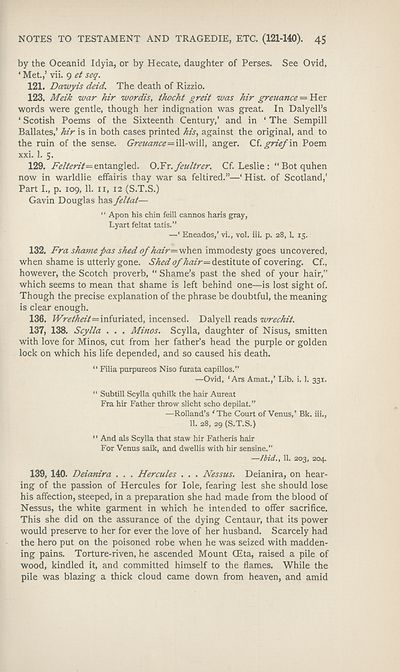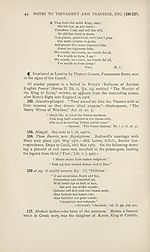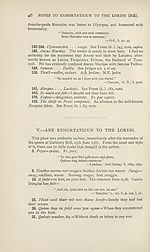Scottish Text Society publications > Old series > Satirical poems of the time of the reformation > Volume 2, 1893
(61)
Download files
Complete book:
Individual page:
Thumbnail gallery: Grid view | List view

NOTES TO TESTAMENT AND TRAGEDIE, ETC. (121-140). 45
by the Oceanid Idyia, or by Hecate, daughter of Perses. See Ovid,
‘ Met.,’ vii. 9 et seq.
121. Dawyis deid. The death of Rizzio.
123. Meik war Mr wordis, thocht greit was Mr greuance = Her
words were gentle, though her indignation was great. In Dalyell’s
‘ Scotish Poems of the Sixteenth Century,’ and in ‘ The Sempill
Ballates,’ Mr is in both cases printed Ms, against the original, and to
the ruin of the sense. Greuance=\W-\m\\, anger. Q{. grief \x\ Poem
xxi. 1. 5.
129. entangled. O.Yr. feultrer. Cf. Leslie : “Botquhen
now in warldlie effairis thay war sa feltired.”—‘ Hist, of Scotland,’
Part L, p. 109, 11. 11, 12 (S.T.S.)
Gavin Douglas has feltat—
“ Apon his chin feill cannos haris gray,
Lyart feltat tatis.”
—‘ Eneados,’ vi., vol. iii. p. 28, 1. 15.
132. Fra shame pas shed of hair='Nh&n immodesty goes uncovered,
when shame is utterly gone. Shed(7/'^rtz>= destitute of covering. Cf.,
however, the Scotch proverb, “ Shame’s past the shed of your hair,”
which seems to mean that shame is left behind one—is lost sight of.
Though the precise explanation of the phrase be doubtful, the meaning
is clear enough.
136. Wretheit= infuriated, incensed. Dalyell reads wrechit.
137, 138. Scylla . . . Minos. Scylla, daughter of Nisus, smitten
with love for Minos, cut from her father’s head the purple or golden
lock on which his life depended, and so caused his death.
“ Filia purpureos Niso furata capillos.”
•—Ovid, ‘ Ars Amat.,’ Lib. i. 1. 331.
“ Subtill Scylla quhilk the hair Aureat
Fra hir Father throw slicht scho depilat.”
—Rolland’s ‘The Court of Venus,’ Bk. iii.,
11. 28, 29 (S.T.S.)
“ And als Scylla that staw hir Fatheris hair
For Venus saik, and dwellis with hir sensine.”
—Ibid., 11. 203, 204.
139, 140. Deianira . . . Hercules . . . Nessus. Deianira, on hear¬
ing of the passion of Hercules for lole, fearing lest she should lose
his affection, steeped, in a preparation she had made from the blood of
Nessus, the white garment in which he intended to offer sacrifice.
This she did on the assurance of the dying Centaur, that its power
would preserve to her for ever the love of her husband. Scarcely had
the hero put on the poisoned robe when he was seized with madden¬
ing pains. Torture-riven, he ascended Mount Gita, raised a pile of
wood, kindled it, and committed himself to the flames. While the
pile was blazing a thick cloud came down from heaven, and amid
by the Oceanid Idyia, or by Hecate, daughter of Perses. See Ovid,
‘ Met.,’ vii. 9 et seq.
121. Dawyis deid. The death of Rizzio.
123. Meik war Mr wordis, thocht greit was Mr greuance = Her
words were gentle, though her indignation was great. In Dalyell’s
‘ Scotish Poems of the Sixteenth Century,’ and in ‘ The Sempill
Ballates,’ Mr is in both cases printed Ms, against the original, and to
the ruin of the sense. Greuance=\W-\m\\, anger. Q{. grief \x\ Poem
xxi. 1. 5.
129. entangled. O.Yr. feultrer. Cf. Leslie : “Botquhen
now in warldlie effairis thay war sa feltired.”—‘ Hist, of Scotland,’
Part L, p. 109, 11. 11, 12 (S.T.S.)
Gavin Douglas has feltat—
“ Apon his chin feill cannos haris gray,
Lyart feltat tatis.”
—‘ Eneados,’ vi., vol. iii. p. 28, 1. 15.
132. Fra shame pas shed of hair='Nh&n immodesty goes uncovered,
when shame is utterly gone. Shed(7/'^rtz>= destitute of covering. Cf.,
however, the Scotch proverb, “ Shame’s past the shed of your hair,”
which seems to mean that shame is left behind one—is lost sight of.
Though the precise explanation of the phrase be doubtful, the meaning
is clear enough.
136. Wretheit= infuriated, incensed. Dalyell reads wrechit.
137, 138. Scylla . . . Minos. Scylla, daughter of Nisus, smitten
with love for Minos, cut from her father’s head the purple or golden
lock on which his life depended, and so caused his death.
“ Filia purpureos Niso furata capillos.”
•—Ovid, ‘ Ars Amat.,’ Lib. i. 1. 331.
“ Subtill Scylla quhilk the hair Aureat
Fra hir Father throw slicht scho depilat.”
—Rolland’s ‘The Court of Venus,’ Bk. iii.,
11. 28, 29 (S.T.S.)
“ And als Scylla that staw hir Fatheris hair
For Venus saik, and dwellis with hir sensine.”
—Ibid., 11. 203, 204.
139, 140. Deianira . . . Hercules . . . Nessus. Deianira, on hear¬
ing of the passion of Hercules for lole, fearing lest she should lose
his affection, steeped, in a preparation she had made from the blood of
Nessus, the white garment in which he intended to offer sacrifice.
This she did on the assurance of the dying Centaur, that its power
would preserve to her for ever the love of her husband. Scarcely had
the hero put on the poisoned robe when he was seized with madden¬
ing pains. Torture-riven, he ascended Mount Gita, raised a pile of
wood, kindled it, and committed himself to the flames. While the
pile was blazing a thick cloud came down from heaven, and amid
Set display mode to: Large image | Zoom image | Transcription
Images and transcriptions on this page, including medium image downloads, may be used under the Creative Commons Attribution 4.0 International Licence unless otherwise stated. ![]()
| Publications by Scottish clubs > Scottish Text Society publications > Old series > Satirical poems of the time of the reformation > Volume 2, 1893 > (61) |
|---|
| Permanent URL | https://digital.nls.uk/107427491 |
|---|
| Attribution and copyright: |
|
|---|
| Description | A collection of over 100 Scottish texts dating from around 1400 to 1700. Most titles are in Scots, and include editions of poetry, drama, and prose by major Scottish writers such as John Barbour, William Dunbar, Gavin Douglas, and George Buchanan. Edited by a key scholarly publisher of Scotland's literary history, and published from the late 19th century onwards by the Scottish Text Society. Available here are STS series 1-3. |
|---|

